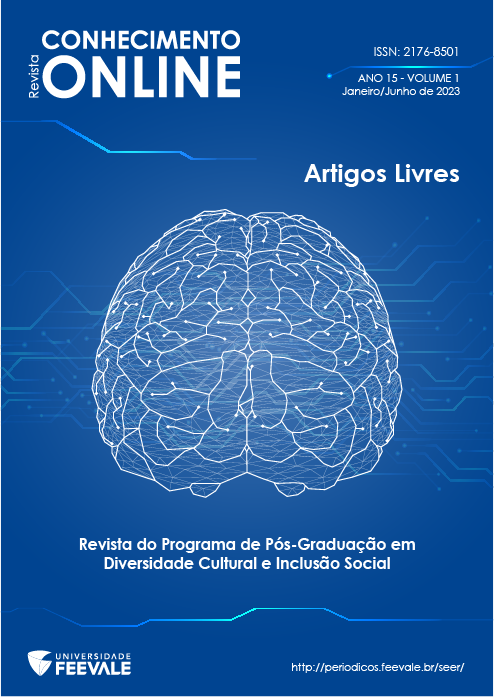EDUCAÇÃO ESPECIAL EM TEMPOS DE PANDEMIA: A INCLUSÃO DE ALUNOS COM TRANSTORNO DO ESPECTRO AUTISTA ATRAVÉS DAS AULAS NÃO PRESENCIAIS
DOI:
https://doi.org/10.25112/rco.v1.2713Keywords:
Aulas não Presenciais, Transtorno do Espectro Autista, Educação InfantilAbstract
Education is a right for everyone and this educational right is also guaranteed and extended to children with Autism Spectrum Disorder (ASD). And from the pandemic of the new coronavirus, which began in 2020 and which still remains, the classes that until then were totally in-person, started to have a new configuration. Every school community needed to reinvent itself in a short period of time. And in relation to the student with ASD, who depends a lot on predictability in their routine, the following issue arose: how was the autistic student in Early Childhood Education from regular public schools in Lucas do Rio Verde MT included in remote classes in 2020? Thus, it was intended, in general, to investigate how schools and early childhood education teachers structured their work with a view to providing adequate conditions for the inclusion of this student in non-presential classes. The research subjects were 9 pedagogue teachers who answered a questionnaire previously prepared and sent via a form on google, during the month of May 2021. The data show that the teachers, each in their own way and with the help of the school management, families, worked and dedicated themselves with honor and managed to include these children in their non-presential classes, with different participations and achievements, but all included in the teaching-learning process.
References
ARANHA, Maria Salete Fábio (org.). Estratégias para a educação de alunos com necessidades educacionais especiais. Brasília: Ministério da Educação, Secretaria de Educação Especial, 2003.
BRASIL. Lei n° 9.394, de 20 de dezembro de 1996. Lei de Diretrizes e Diretrizes Da Educação Nacional (LDB). Brasília: MEC, 1996.
BRASIL. Congresso Nacional. Constituição: República Federativa do Brasil. Brasília, 1988.
OAB DF. Cartilha Dos Direitos Da Pessoa Autista. Brasília: OAB, 2018. Disponível em: http://www.oabdf.org.br/cartilhas/cartilha-direitos-da-pessoa-com-autismo/. Acesso em: 12 abr. 2021.
CUNHA, Eugênio. Autismo na escola: um jeito diferente de aprender, um jeito diferente de ensinar – ideias e práticas pedagógicas. 3. ed. Rio de Janeiro: Wak Editora, 2015.
DECLARAÇÃO DE SALAMANCA. Sobre Princípios, Políticas e Práticas na Área das Necessidades Educativas Especiais. Disponível em: http://portal.mec.gov.br/seesp/arquivos/pdf/salamanca.pdf. Acesso em: 09 maio 2021.
KARAGIANIS, A.; STAINBACK, W.; STAINBACK, S. Fundamentos do ensino inclusivo. In: STAINBACK, W.; STAINBACK, S. (Orgs.). Inclusão: Um guia para educadores. Porto Alegre: Artmed, 1999.
MANTOAN, Maria Teresa Eglér. O desafio das diferenças nas escolas. 5. ed. Petrópolis: Vozes, 2013.
MANUAL DE ORIENTAÇÃO DEPARTAMENTO CIENTÍFICO DE PEDIATRIA DO DESENVOLVIMENTO E COMPORTAMENTO. Transtorno do Espectro do Autismo, nº 05, abril de 2019. Disponível em: https://www.sbp.com.br. Acesso em: 03 maio 2021.
MINAYO, Maria Cecília de Souza (org.). Pesquisa Social. Teoria, método e criatividade. 18. ed. Petrópolis: Vozes, 2001.
OLIVEIRA, A. P. S.; MALUF, A. M. F.; COSTA, N. R. D.; RAUBER, T. B.; KRAUSE, M. P. Família, Escola e Limites: Uma Parceria Para a Vida. Porto Alegre: Colégio La Salle São João, 2006.
RICHARDSON, R. J. Pesquisa Social: métodos e técnicas. 3. ed. São Paulo: Atlas, 2012.
SILVA, C. A.; SILVA, R. A.; ASFORA, R. Práticas pedagógicas inclusivas com crianças com Transtorno do Espectro Autista (TEA) na Educação Infantil. Trabalho de Conclusão de Curso (Graduação em Pedagogia) – Centro de Educação, Universidade Federal de Pernambuco, 2015. Disponível em: https://www.ufpe.br. Acesso em: 06 maio 2021.
TEIXEIRA, G. Manual dos transtornos escolares. Rio de Janeiro: Edições BestBolso, 2013.
Downloads
Published
How to Cite
Issue
Section
License
Copyright (c) 2022 Arlete Cherobini Orth

This work is licensed under a Creative Commons Attribution 4.0 International License.
• Os autores mantêm os direitos autorais e concedem à revista o direito de primeira publicação com o trabalho licenciado sob a Licença Creative Commons - Attribution 4.0 International (CC BY 4.0).
• Os autores são estimulados a publicar e distribuir seu trabalho online (ex.: em repositórios institucionais ou na sua página pessoal), pois isso pode aumentar o impacto e a citação do trabalho publicado.


